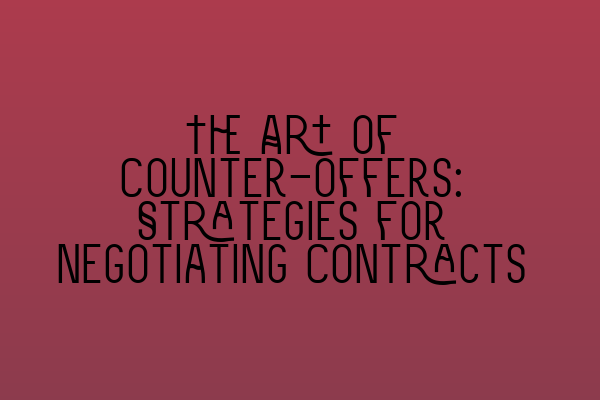The Art of Counter-offers: Strategies for Negotiating Contracts
When it comes to negotiating contracts, one of the most powerful tools in your arsenal is the counter-offer. A well-crafted counter-offer can help you secure favorable terms, protect your interests, and ensure a mutually beneficial outcome. In this article, we will explore the art of counter-offers and share some effective strategies to help you navigate the negotiation process.
Understanding the Importance of Counter-offers
Before diving into the strategies, it’s crucial to understand why counter-offers are so crucial in contract negotiations. A counter-offer serves as a response to an initial offer from the other party, signaling your willingness to negotiate and setting the stage for a mutually agreeable agreement. By presenting a counter-offer, you retain control over the negotiation and have the opportunity to shape the terms of the contract to your advantage.
Without further ado, let’s explore some strategies to help you master the art of counter-offers:
1. Analyze the Initial Offer
Before crafting your counter-offer, take the time to analyze the initial offer in detail. Identify the strengths and weaknesses of the proposal, considering factors such as price, timeline, scope, and any additional provisions. This analysis will help you understand the other party’s position and enable you to craft a counter-offer that addresses their concerns while protecting your interests.
2. Prioritize Your Objectives
When formulating your counter-offer, it’s essential to prioritize your objectives. Consider what aspects of the initial offer are most important to you and which ones you are willing to concede. This strategic approach will allow you to focus your negotiation efforts on the key areas that align with your goals, maximizing your chances of achieving a favorable outcome.
3. Present Clear and Concise Terms
A well-written counter-offer should be clear, concise, and easy to understand. Avoid ambiguity and use language that is specific and unambiguous. Clearly outline the changes you are proposing and how they align with your objectives. This approach demonstrates your professionalism and ensures that there is no confusion or miscommunication during the negotiation process.
4. Justify Your Position
When presenting your counter-offer, provide a rationale for your proposed changes. Justify why your terms are fair and reasonable, and how they will benefit both parties. By providing a solid justification, you enhance the perceived value of your counter-offer and increase the likelihood of the other party accepting your terms.
5. Remain Flexible
While it’s essential to be clear about your objectives and desired terms, it’s also crucial to remain flexible during the negotiation process. Remember that negotiation is a give-and-take, and compromise is often necessary to reach an agreement. Be open to alternatives and consider creative solutions that meet the needs of both parties.
6. Anticipate Potential Responses
As you prepare your counter-offer, anticipate potential responses from the other party. Consider their motivations and objectives, and think about how they might react to your proposals. This anticipatory approach allows you to pre-emptively address their concerns and tailor your counter-offer to overcome any potential objections.
7. Seek Professional Guidance
Negotiating contracts can be complex and challenging, especially when high stakes are involved. In such situations, seeking professional guidance from experienced solicitors can significantly enhance your negotiation outcomes. They can provide invaluable advice, offer a fresh perspective, and ensure that your counter-offer aligns with legal requirements.
Mastering the art of counter-offers is a valuable skill for any professional involved in contract negotiation. By understanding the importance of counter-offers, prioritizing your objectives, presenting clear terms, justifying your position, remaining flexible, anticipating responses, and seeking professional guidance, you can secure favorable outcomes and protect your interests.
For more insights into the legal field and tips on advancing your career, check out these related articles:
- Mentorship for Aspiring Solicitors: Nurturing Talent in the Legal Field
- Legal Challenges and Pitfalls: Navigating the Complexities of the Legal System
- Demystifying the Solicitors Qualifying Examination (SQE): What You Need to Know
- Embracing Diversity: Advancing Inclusivity in the Legal Profession
- Recognizing Excellence: Law Industry Awards and Accolades
Remember, successful contract negotiation requires preparation, skill, and strategic thinking. By honing your ability to craft effective counter-offers, you can navigate the complexities of contract negotiation with confidence and achieve outcomes that align with your goals. Good luck!
